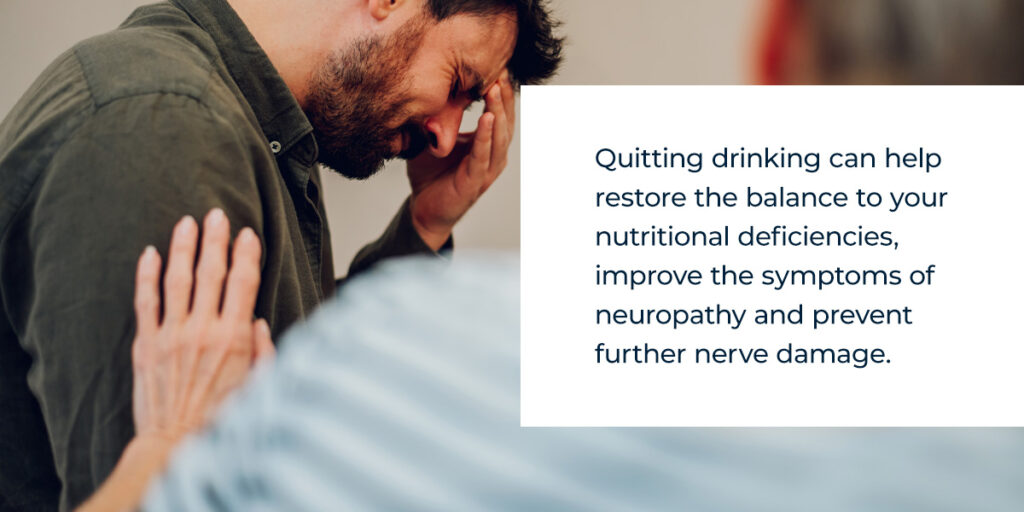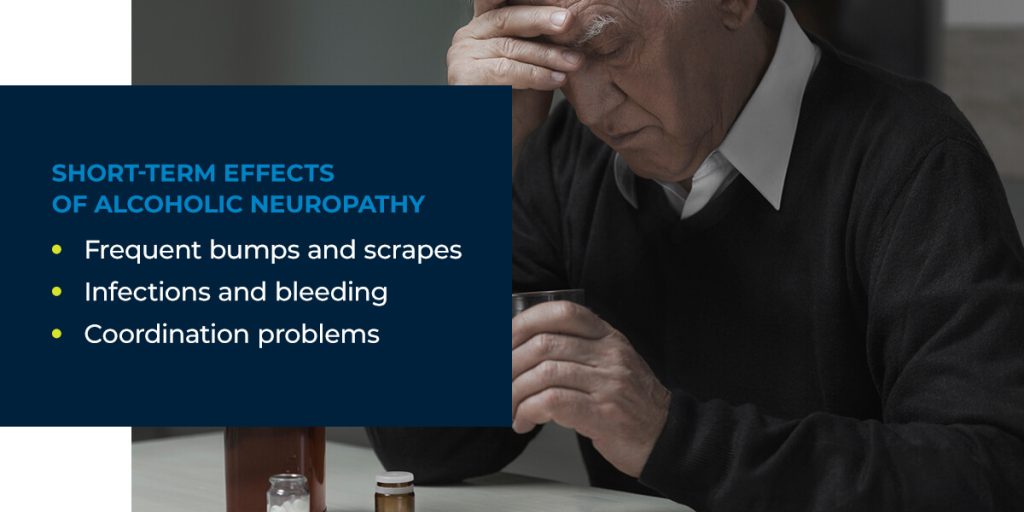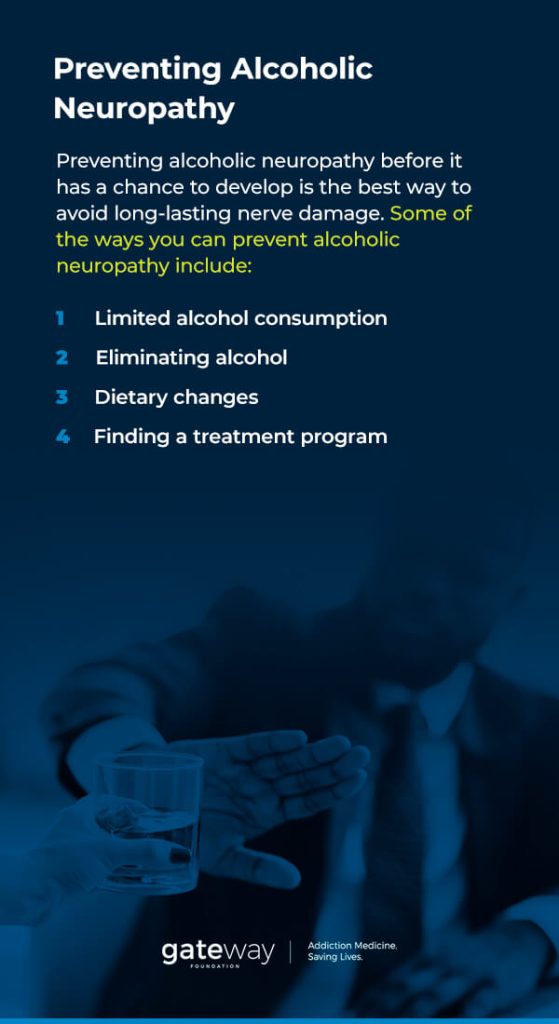- Mar 16
- Addiction
Alcohol is one of the most misused substances in the world, and over 18 million adults in the United States have an alcohol use disorder (AUD) with symptoms ranging from mild to severe. An AUD creates an urge to drink and makes it difficult for a person to stop once they’ve started.
Alcohol can seriously affect a person’s health, damaging the liver, kidneys, heart and brain. However, the toxic effects of alcohol can be even more extensive by affecting the nervous system and causing alcohol-related nerve damage. A person who drinks excessively over a long period might develop alcoholic neuropathy, which can be debilitating when left untreated.
What Is Alcoholic Neuropathy?
Alcoholic neuropathy is a condition caused by long-term alcohol consumption. Alcohol damages the peripheral nerves in the body, which are responsible for sending signals to the brain, body and spinal cord. These nerves help you feel sensations, direct your movement and control your motor coordination.
It’s estimated that anywhere between 25 to 66 percent of people with an AUD have some form of alcoholic neuropathy. People with an AUD drink frequently, and if they don’t seek treatment, the disorder can be long-lasting.
Excessive drinking is the number one cause of peripheral neuropathy, which can lead to a person feeling tingling sensations or pain in their limbs or extremities. They may also experience muscle weakness and atrophy in severe cases.
Alcoholic neuropathy can seriously hinder a person’s mobility if the condition is allowed to develop. People with this condition may find it challenging to complete daily tasks that they once could, forcing them to rely on outside help and impacting their quality of life.

What Causes Alcoholic Neuropathy?
A common cause of peripheral neuropathy is long-term excessive drinking. However, other factors might contribute to the development of the condition.
Alcohol causes inflammation of the stomach lining and digestive tract. When these are inflamed, it becomes difficult for the body to absorb nutrients, leading to various vitamin deficiencies.
Consumption of alcohol can alter the levels of certain nutrients that are essential to proper nerve function, including vitamin B6, vitamin B12 and vitamin E. Quitting drinking can help restore the balance to your nutritional deficiencies, improve the symptoms of neuropathy and prevent further nerve damage. In severe cases, some nerve damage caused by chronic alcoholism is permanent.
Alcohol can also cause a thiamine deficiency, which can cause neuropathy in people with an AUD. One of the symptoms of a thiamine deficiency is a loss of appetite, further contributing to existing nutritional deficiencies. It can even cause heart, brain and nerve abnormalities in severe cases.
There are some risk factors to developing alcoholic neuropathy, including:
- Malnutrition: If you’re not getting enough nutrients from your diet, drinking alcohol will only prevent your body from absorbing nutrients even further, increasing the likelihood of neuropathy.
- Family history of AUD: If you have a genetic predisposition to chronic alcohol misuse, the chances of developing an AUD are higher. An increased risk of developing an AUD also increases your risk of developing alcoholic neuropathy.
- Toxicity of alcohol: Alcohol itself is toxic for the body, and drinking is one of the most predominant risk factors for developing alcoholic neuropathy, even if you aren’t experiencing malnutrition or have a family history of alcohol.
Chronic drinking combined with the above risk factors can increase your chances of developing alcoholic neuropathy. People with this condition might find it challenging to perform daily tasks due to painful sensations and other nerve damage symptoms. If they’re unaware that excessive drinking is the cause of their symptoms, they may continue to drink more in an attempt to find relief from their pain. However, continuing to drink will only worsen their symptoms once the effects of alcohol have worn off.
Symptoms and Signs of Alcoholic Neuropathy
Alcoholic neuropathy affects movements and creates sensations that can range from mild to severe, and how much alcohol causes this neuropathy can vary from person to person. Severe alcoholic neuropathy symptoms aren’t life-threatening, but they can decrease a person’s quality of life and create long-lasting disabilities.
The signs and symptoms of alcoholic neuropathy affect each part of the body differently since nerves serve a specific function in various places. One of the common parts of the body affected is the arms and legs. If you’re experiencing neuropathy in these locations, you might feel:
- Tingling or burning sensations
- Numbness
- Prickly sensations
- Muscle aches, spasms or cramps
- Muscle weakness
- Loss of muscle function
It’s also possible to develop other movement disorders and atrophy, where part of the body wastes away. If the condition is allowed to progress in severity, the damage could become permanent.
Other locations affected by alcoholic neuropathy are the urinary tract and bowels. The symptoms a person might experience with this condition include:
- Inability to control the bladder
- Constipation or diarrhea
- Difficulty urinating
- The sensation that you can’t fully empty your bladder
There are other ways that neuropathy affects the body, including sexual dysfunction, erectile dysfunction, impaired speech, difficulty swallowing, intolerance to heat and dizziness. The progression of alcoholic neuropathy is gradual, and it can take months or even years to see many of these symptoms appear.
These symptoms can seriously impact a person’s quality of life and make it difficult to perform different tasks. If you suspect that you might be experiencing some of the symptoms of alcoholic neuropathy, it’s vital to talk to a healthcare professional right away. Catching this condition early, receiving a diagnosis and treating the symptoms of alcoholic neuropathy, as well as the AUD itself, can increase the likelihood of recovery.
It’s important to remember that severe cases of alcoholic neuropathy can cause permanent damage. However, that doesn’t mean treatment can’t help alleviate some of the symptoms and improve your quality of life. If you’re able to treat an AUD early enough, you may be able to prevent further nerve damage and help keep the condition from manifesting altogether.
What Are the Effects of Alcoholic Neuropathy?
Alcoholic neuropathy has multiple effects on the body caused by nerve damage, ranging from mild to severe. These effects can be short-term if the condition is diagnosed and treated early on, or they can be long-term and affect an individual’s lifestyle.

Short-Term Effects of Alcoholic Neuropathy
Decreased sensations are one of the most common effects of neuropathy since our nerves are responsible for our sense of touch. A person with alcoholic neuropathy might feel reduced sensations in their extremities, such as the hands and feet. The inability to feel sensations normally can cause various complications, including:
- Frequent bumps and scrapes: The inability to feel pain accurately or fully can increase your likelihood of getting minor injuries. Someone with this condition might not be able to feel it when they stub their toe on the corner of a table or scrape their knee, meaning they’re less careful than they otherwise would be, increasing the chances of these injuries. Frequent bruising is also common.
- Infections and bleeding: If someone with this condition cannot feel pain normally, they may be unaware that a wound exists or may believe an injury is less severe than it is, leaving them vulnerable to infections and bleeding. Left untreated, infections have the potential to become life-threatening if they’re not caught and treated in time.
- Coordination problems: Alcoholic neuropathy can cause problems with coordination of movements and fine motor skills, impacting daily activities, such as exercise, walking or typing. This effect can negatively impact a person’s life. For example, if you’re required to type for work, your performance may be affected due to the inability to type.
One of the other common effects of alcoholic neuropathy is pain and hypersensitivity. While some people may feel decreased sensations, others might be more sensitive. A person with this condition can be sensitive to touch and even feel pain while resting. The lightest touch can feel painful, particularly in the fingers and toes. The pain can feel like a burning, throbbing or pins-and-needles sensation.
Alcoholic neuropathy can also cause autonomic neuropathy. Alcohol consumption can weaken the autonomic nerves, which impact bowel and bladder function. It can also cause sexual dysfunction.
Long-Term Effects of Alcoholic Neuropathy
Many short-term effects can become long-term if a person continues to drink and doesn’t seek treatment for an AUD or alcoholic neuropathy.
Decreased sensations in advanced neuropathy can cause an off-balance feeling, especially when the eyes are closed. This feeling can be particularly dangerous since it can cause falls, which can result in fractured bones or more severe injuries.
Pain and hypersensitivity can also become more severe if the condition continues to progress. These feelings can become long-term and will vary in intensity. Pain and hypersensitivity can even seem to start to fade for months before getting worse again.
Muscle weakness is one of the most common long-term effects of alcoholic neuropathy. People with this condition might have motor weakness from nerve damage, and the nerves can’t send or receive signals. Muscle function is negatively impacted as a result.
Muscle weakness most often appears in the hands or feet, and if the condition isn’t treated, it’s possible to develop atrophy in the muscles after they haven’t been used for a while. Atrophy is when the muscle cells degenerate and waste away, increasing the severity of muscle weakness.
Treating Alcoholic Neuropathy
Treating neuropathy early on can limit the severity of the symptoms. First, you must receive a diagnosis from your physician, and multiple tests might need to be conducted to determine how far the condition has progressed. You can be diagnosed through physical examinations, nerve conduction tests, nerve biopsy, blood or urine tests, and imaging. Once your doctor has diagnosed you with alcoholic neuropathy, they can recommend a treatment plan.
Some treatments include using different types of medications to manage the pain. Some of the medications include:
- Pain medications
- Antidepressants
- Anti-seizure medication
Your doctor might also recommend you start taking vitamin supplements to help replace the lost vitamins from alcohol consumption. Providing the body with the necessary nutrients can help improve nerve function and reduce many of the symptoms of alcoholic neuropathy.
Medications can’t help with all of the symptoms. For instance, it can’t remedy reduced sensation, muscle weakness and coordination or balance problems. However, ceasing alcohol consumption can improve these symptoms.
If alcohol neuropathy progresses long enough, the liver can become damaged, and a transplant may be necessary. A transplant has the potential to improve your symptoms, but this is usually when alcoholic neuropathy has progressed to a point where the damage is irreversible. There’s a possibility for little to no improvement in these cases for certain symptoms.
Once you’ve started to recover, you can have a loved one or caretaker help you with tasks, such as adjusting to a cane, walker or wheelchair. They can also help you perform daily tasks safely, such as testing bath water temperature with gloves to prevent skin irritation. You can also see a physical therapist to help rebuild your muscle strength.
The most important thing is to catch the signs of alcoholic neuropathy early to prevent further nerve damage. You can seek treatment for AUD from a professional treatment center to reduce your symptoms by discontinuing alcohol use. Gateway Foundation offers alcohol addiction treatment to help you overcome alcohol dependence and improve your quality of life.

Preventing Alcoholic Neuropathy
Preventing alcoholic neuropathy before it has a chance to develop is the best way to avoid long-lasting nerve damage. Some of the ways you can prevent alcoholic neuropathy include:
- Limited alcohol consumption: If you haven’t started to show symptoms of alcoholic neuropathy, you should try to limit your alcohol consumption. Moderate drinking is measured as one drink a day for women and two for men. Be sure to watch out for signs of an AUD so you can seek treatment if necessary.
- Eliminating alcohol: If you’ve already started to show signs of alcoholic neuropathy, you should take the necessary measures to eliminate alcohol from your life. You can prevent your symptoms from worsening and recover if you catch the signs early enough.
- Dietary changes: Part of what causes alcoholic neuropathy is vitamin deficiencies caused by alcohol. These deficiencies can cause nerve damage. You should eat a nutrient-rich diet and start taking vitamin supplements if necessary to prevent the onset of alcoholic neuropathy.
- Finding a treatment program: If you’re struggling with an AUD, you should seek treatment from an addiction program to help you reach sobriety. By treating chronic drinking, you can prevent alcoholic neuropathy before it starts to affect your life.
Gateway Foundation can help you prevent alcoholic neuropathy by treating alcohol addiction head-on. If you’re finding it difficult to quit on your own, our professional staff can provide you with treatments and resources to help you manage your addiction and help you reach a life of sobriety.
Find Relief From Your Symptoms With Gateway Foundation
Alcoholic neuropathy, when left untreated, can have a significant impact on a person’s quality of life. The symptoms are often painful and can be challenging to manage without help. The best way to prevent further damage and improve your symptoms is to stop drinking altogether. If you’re struggling with an AUD, this can seem like an overwhelming challenge.
Gateway Foundation is here to help. Our evidence-based alcohol addiction treatment program is tailored to your individual needs so you get the best quality treatment with the highest chance for success. We can help you detox while providing you with the tools and resources to build a healthy life. Take the first step toward recovery and contact us today to learn more about our programs and services.



